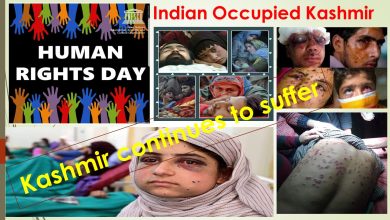
 October 27 is marked as “Black Day” by the people of Kashmir, a day that signifies the beginning of a long and painful chapter in their history. In 1947, Indian occupation forces landed in Srinagar, claiming to secure the territory after the signing of the controversial Instrument of Accession by Maharaja Hari Singh.
October 27 is marked as “Black Day” by the people of Kashmir, a day that signifies the beginning of a long and painful chapter in their history. In 1947, Indian occupation forces landed in Srinagar, claiming to secure the territory after the signing of the controversial Instrument of Accession by Maharaja Hari Singh.
This event has since been a focal point of conflict and debate, as it marked not just a military invasion, but a profound infringement on the Kashmiri people’s right to self-determination. The term “Black Day” encapsulates the deep sense of loss and betrayal felt by Kashmiris. It symbolizes the day their voices were silenced and their aspirations for autonomy dismissed. The promise made by Indian leaders, including Prime Minister Jawaharlal Nehru, to hold a plebiscite allowing the Kashmiri people to choose their future has remained unfulfilled. Instead, the region has experienced decades of military presence, restrictions on freedoms, and human rights violations.
In rethinking October 27, it’s crucial to shift the narrative from a mere historical account to an understanding of the ongoing struggle for justice and self-determination. The geopolitical discourse often frames the Kashmir issue as a territorial dispute between India and Pakistan, overshadowing the vital perspective of the Kashmiri people themselves. Their plight should not be seen solely through the lens of international politics but as a profound humanitarian concern. Kashmiris have endured continuous repression and marginalization, yet their resilience remains unbroken. As we acknowledge Black Day, it is essential to recognize the ongoing movement for self-determination, which transcends the historical grievances of 1947. The desire for autonomy is rooted in the Kashmiri people’s identity, culture, and aspiration for a peaceful existence free from external imposition.
“Black Day” reminds us of how the Kashmiris’ right to choose their own future was taken away. But it also reminds us that the future of Kashmir must include the people of Kashmir in the process. The world has a responsibility to ensure that Kashmiris, who have faced years of human rights violations and military control are heard and respected. The impact on the people of Kashmir has been tragic. From the violence after October 27, 1947 to the many forced migrations, the people of Kashmir have suffered greatly. They have experienced deaths, displacement and growing up in a place filled with fear and violence. Reports of killings, disappearances and abuse continue to show the suffering of the people in the region.
Efforts by the international community to bring peace have often failed because bigger countries are more focused on their own interests. Meanwhile, the region has become one of the most militarized areas in the world. The new path forward must be one of reconciliation and respect for human rights. The international community must reconsider its role in the Kashmir conflict. The United Nations resolutions affirming the right to self-determination have been largely ignored. Global actors should advocate for a renewed commitment to facilitating dialogue that includes the voices of Kashmiris, ensuring that their rights and aspirations are central to any resolution.
For peace in South Asia, it is crucial that the Jammu and Kashmir dispute is resolved according to UN Security Council Resolutions and the wishes of the Kashmiri people. For over seven decades, successive generations of Kashmiris have waited for the UN to fulfill its promises. The international community must pressure India to stop human rights violations, reverse its illegal actions of August 5, 2019 and implement the Security Council Resolutions.
Pakistan remains fully committed tosupporting the Kashmiri people’s right to self-determination and will continue to provide political, moral, and diplomatic backing for their just struggle. Efforts to improve the economy, build trust, and respect human rights are important. A peaceful solution would not only help Kashmir but also improve relations in South Asia and create more opportunities for cooperation.
Ultimately, October 27 serves as a reminder not just of past injustices but of the urgent need for a future where the Kashmiri people can freely decide their destiny. By rethinking this day, we honor the struggle of those who have fought for their rights and affirm the importance of listening to the voices that have long been marginalized. The path forward must prioritize peace, justice, and the fundamental right of self-determination for the people of Kashmir. It is time to focus on peace, justice, and the right of the Kashmiri people to shape their own future. Only through a new approach, based on dialogue and respect, can we hope to resolve this long-standing conflict. This October 27, we need to realize that the Kashmir conflict is not just about borders. It is about giving people the right to decide their own future.
Aneeqa Aamir is pursuing a Bachelor of IR from the International Islamic University, Islamabad and currently, she is intern at Kashmir Institute of International Relations.








